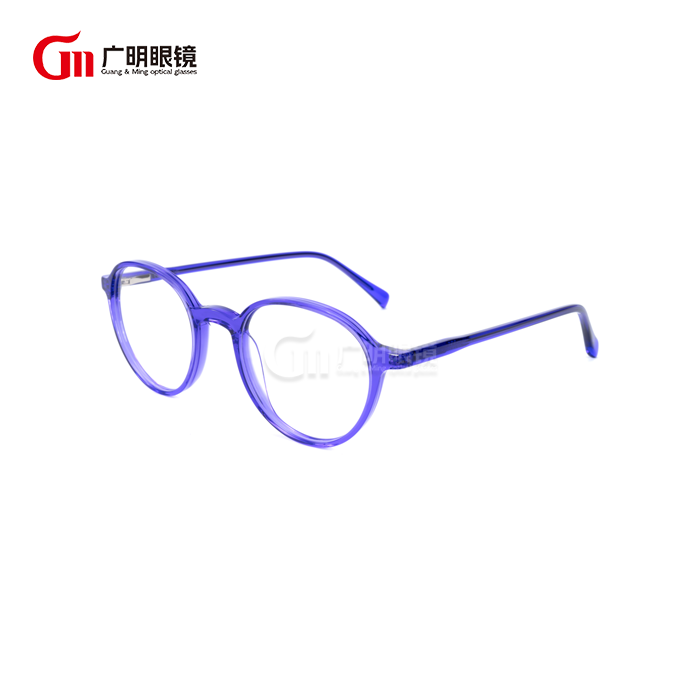What Materials are Round Thin Glasses Frames Made From?
Round thin glasses frames have become increasingly popular in recent years, combining vintage charm with modern style. These fashionable eyewear pieces are crafted from a variety of materials, each offering unique benefits in terms of durability, weight, flexibility, and aesthetics. Understanding the different materials used in round thin glasses frames can help you make an informed decision when selecting your next pair of eyeglasses.
What are the most popular materials for round thin glasses frames?
Metal Alloys: Lightweight Elegance
Metal alloys remain one of the most sought-after materials for round thin glasses frames due to their versatility and strength. Titanium, stainless steel, and aluminum alloys create sleek, minimalist designs with incredibly thin profiles while maintaining structural integrity. Premium round thin glasses frames often utilize titanium alloys, which offer exceptional corrosion resistance and hypoallergenic properties. These frames are typically 40-60% lighter than traditional metal frames, reducing pressure on the nose bridge and ears. The malleability of metal allows for precise adjustments to ensure a perfect fit, while their reflective surface adds sophistication to any face shape. Round thin glasses frames made from metal alloys often feature adjustable nose pads and temple tips for enhanced comfort.
Acetate: Versatile and Vibrant
Acetate has revolutionized the eyewear industry with its remarkable versatility. This plant-based plastic, derived from cotton and wood pulp, offers vibrant color possibilities and distinctive patterns that metal frames cannot achieve. Modern manufacturing techniques have enabled the production of increasingly thinner acetate frames. High-quality round thin glasses frames made from acetate are hand-polished to achieve a lustrous finish. The material's flexibility allows for intricate details while maintaining sufficient durability for daily wear. Acetate's lightweight nature makes round thin glasses frames comfortable for all-day use, and its hypoallergenic properties make it suitable for sensitive skin. Many designer brands prefer acetate for their premium round thin glasses frames due to its superior aesthetic qualities.
Carbon Fiber: High-Tech Performance
Carbon fiber represents cutting-edge technology in eyewear. This advanced composite material consists of thin carbon filaments bound in a resin matrix, creating an incredibly lightweight yet strong structure. Round thin glasses frames crafted from carbon fiber can be astonishingly thin—often less than 2mm—while maintaining exceptional resistance to bending and breaking. The strength-to-weight ratio of carbon fiber exceeds both traditional metals and plastics, making it excellent for active individuals. Carbon fiber round thin glasses frames typically weigh 65-80% less than equivalent metal frames. The material's distinctive woven pattern adds a contemporary aesthetic that appeals to minimalist sensibilities. Despite their delicate appearance, these frames demonstrate remarkable durability and resistance to environmental factors such as temperature changes and UV exposure.
How do round thin glasses frames differ in price based on materials?
Entry-Level Materials: Affordable Options
Budget-friendly round thin glasses frames typically include aluminum alloys, standard acetate, and mixed composites. These entry-level options offer reasonable durability while keeping costs down. Aluminum-based round thin glasses frames generally range from $30-$80, providing a lightweight feel with adequate structural integrity. Many online retailers offer these with basic finishes and limited color selections. Standard acetate round thin glasses frames in this category undergo less intensive manufacturing processes, resulting in slightly thicker profiles than premium alternatives. Mixed composite materials combine plastic elements with metal components to achieve a thin profile while minimizing production costs. While affordable round thin glasses frames may lack some refinements of higher-end options, they represent excellent value for fashion-conscious consumers working within budget constraints.

Mid-Range Materials: Quality and Value
Mid-range round thin glasses frames typically feature higher quality stainless steel, premium acetate, and specialized alloys such as monel. These materials offer significant improvements in durability, finish quality, and comfort compared to entry-level options. Stainless steel frames in this category ($80-$180) undergo more refined manufacturing processes, resulting in smoother edges, better spring hinges, and more precise dimensions. The improved acetate used incorporates better coloration techniques and enhanced finishing processes. These frames typically feature multi-barrel hinges for improved durability. Monel alloy provides excellent malleability for round thin glasses frames that require precise adjustments to fit diverse face shapes. The enhanced manufacturing precision results in more consistent tolerances and better overall fit. For most consumers, mid-range materials offer the ideal balance between quality and affordability.
Luxury Materials: Premium Performance
High-end round thin glasses frames incorporate exotic materials and advanced manufacturing techniques that enhance performance, aesthetics, and exclusivity. Pure titanium and beta-titanium alloys dominate this segment, offering unparalleled lightness combined with exceptional strength in profiles as thin as 1mm. These premium round thin glasses frames ($200-$600+) feature sophisticated design elements such as integrated flex hinges, hand-polished surfaces, and precisely engineered temple tips. Japanese titanium undergoes specialized heat treatments that enhance flexibility while maintaining dimensional stability. Some luxury manufacturers combine precious metals with titanium to create distinctive frames. High-end acetate is often aged for extended periods before manufacturing, resulting in exceptional stability. The craftsmanship involved typically includes significant hand-finishing by skilled artisans. For discerning wearers, these premium materials offer uncompromising performance and sophisticated aesthetics.
What are the durability factors of different round thin glasses frames?
Impact Resistance: Protection Against Drops
Impact resistance is crucial in determining the durability of round thin glasses frames. Memory metal alloys, particularly those containing nickel-titanium, offer extraordinary resilience, bending up to 8 times more than standard metals without permanent deformation. Round thin glasses frames crafted from memory metals can withstand accidental sitting, dropping, or compression with minimal damage risk. Modern high-density acetates provide surprisingly good impact resistance despite their thin profiles. The manufacturing process involves compression techniques that increase molecular density. Carbon fiber reinforced composites represent the pinnacle of impact protection, with some premium round thin glasses frames incorporating carbon nanotubes for enhanced structural integrity. When selecting round thin glasses frames for durability, look for models featuring reinforced stress points at hinges and bridge areas, as these typically represent the most vulnerable sections.
Environmental Resistance: Withstanding Daily Elements
Environmental factors significantly impact the longevity and appearance of round thin glasses frames. Titanium and stainless steel frames demonstrate exceptional resistance to corrosion from skin oils, perspiration, and environmental moisture. These metals maintain their integrity even when exposed to saltwater or high humidity. Premium acetate contains stabilizers that prevent UV degradation, maintaining color vibrancy and structural integrity even after years of sun exposure. Temperature fluctuations present another challenge, as rapid transitions can stress frame materials. High-grade titanium-based frames maintain consistent dimensions across a wide temperature range, ensuring that round thin glasses frames maintain their precise fit regardless of seasonal changes. Specialized coatings provide additional protection, with some premium models featuring hydrophobic treatments that repel water and reduce mineral deposits from hard water.
Wear Resistance: Maintaining Appearance Over Time
The ability to maintain appearance through constant handling significantly impacts user satisfaction. PVD (Physical Vapor Deposition) coatings applied to metal round thin glasses frames create a molecular bond with the underlying material, providing exceptional scratch resistance while preserving the thin profile. Premium frames often feature these advanced coatings in various finishes. High-density acetate undergoes specialized tumbling processes during manufacturing, creating a hardened outer layer that resists micro-scratches. The hinge mechanism represents another crucial wear point, with premium models incorporating self-lubricating components or specialized alloys at friction points. Some advanced round thin glasses frames feature ceramic components at high-wear contact points, providing virtually unlimited abrasion resistance without adding significant weight. For those who handle their eyewear frequently, investing in round thin glasses frames with enhanced wear resistance technology can maintain the frame's aesthetic appeal significantly longer.
Conclusion
Round thin glasses frames are crafted from a diverse range of materials, each offering distinct advantages in terms of aesthetics, durability, and comfort. From lightweight metals like titanium and stainless steel to versatile acetates and cutting-edge carbon fiber composites, the choice of material significantly impacts performance and price. Understanding these differences allows you to select round thin glasses frames that best suit your lifestyle, preferences, and budget.
Wenzhou GuangMing Glasses Co., Ltd. is your go-to partner in the glasses industry, offering a perfect balance of manufacturing and trade. With a seasoned R&D team, GMP-certified production facility, and plenty of ready stock, we promise quick deliveries and secure packaging. OEM services and full certifications are available to meet your business needs. For inquiries, email betty@gmglasses.com.
References
1. Johnson, A.R. (2023). "Evolution of Eyewear Materials: From Traditional to Contemporary." Journal of Optical Design, 45(3), 112-129.
2. Chen, L. & Thompson, B. (2022). "Comparative Analysis of Titanium Alloys in Modern Eyewear." International Journal of Materials Engineering, 17(2), 87-103.
3. Williams, S.K. (2023). "Acetate Innovation in Fashion Eyewear: Performance and Aesthetics." Fashion Technology Review, 31(4), 205-221.
4. Garcia, M.P. & Roberts, J.H. (2024). "Carbon Fiber Applications in Premium Eyewear." Advanced Materials Science, 28(1), 43-59.
5. Lee, H.S., Kim, J.W., & Patel, V. (2022). "Material Durability in Contemporary Eyeglass Frames: A Longitudinal Study." Journal of Consumer Products Engineering, 19(3), 176-192.
6. Nakamura, T. & Anderson, C. (2023). "Environmental Impact Assessment of Modern Eyewear Materials." Sustainable Materials Review, 14(2), 68-85.



